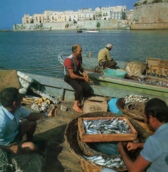|
Italians develop dolphin-saving whistle
Zoomata.com
7th March 2003
Sicilian fishermen, concerned over the number of dolphins
captured in nets, turned to Italy's National Research Council
(CNR) to find a solution.
After three years of research, which tapped the expertise of scientists throughout Europe, the result is a whistle that acts as a deterrent but doesn't harm the animals.
Called EMMA (Electro-acoustic prototype for controlling the behaviour of Marine Mammals), it's perceived by dolphins as a sort of “warning signal” but isn't meant to frighten them.
"At first we thought of developing a signal that could provoke psychological reactions," said researcher Salvatore Mazzola. "For instance the sound of a whale, the natural enemy of the dolphin, or sounds made by dolphins in distress. But they're too smart -- we noticed that after a few weeks they grew used to it and realized there wasn't a real danger."
To overcome the problem, scientists had to come up with a way to interfere with the sonar of dolphins without harming them -- a kind of whistle linked to the nets that emits sounds that are both random in sequence and in volume.
Researchers knew they had a winner when the prototype kept mammals at bay during a three-month fishing period. Italian environmentalist groups have also applauded the result -- having long denounced the accidental capture of dolphins during fishing as a violation of EU protection measures. The Fisherman's Association of San Vito Lo Capo in the province of Trapani turned to the scientists after doing a few statistics -- they reckoned every boat accidentally trapped an average of one to three dolphins in a three-year period.
Top
|
